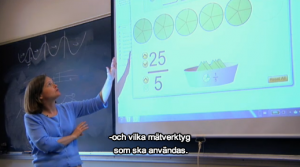See PhET in the July Issue of RSC’s Education in Chemistry
We’re excited to see PhET team member Emily Moore’s study featured in “Probing Use of Simulations“ published in the July 2013 issue of the RSC’s Education in Chemistry.
Emily’s study was designed to provide insight into interactive simulation use during guided-inquiry activities in chemistry classes. In the study, 80 students in a General Chemistry class were given ten minutes to explore PhET simulation Molecule Polarity with no instructions on how to interact with the simulation. Using mouse click data, audio recordings and clicker question responses, she investigated: students’ ability to use the simulation by analyzing the extent to which they explored the simulation, the discussions students engaged in during simulation use, and student perceptions of simulation use.
As RSC Editor, David Read, says, “The analysis of recordings provides a fascinating glimpse of the student perspective, and does support the conclusion that the implicit scaffolding genuinely works.”
To read the full results of the study, see Emily’s article, “Interactive Simulations as Implicit Support for Guided-Inquiry“, in the RSC’s Chemistry Education and Research Practice.






